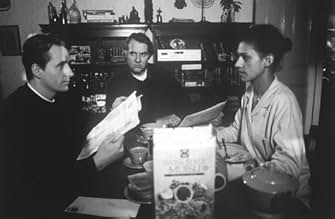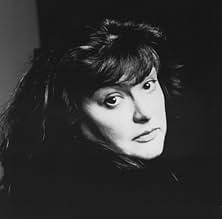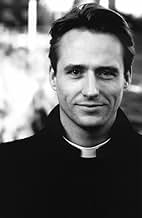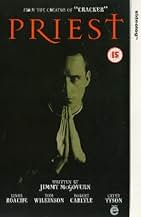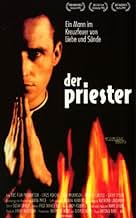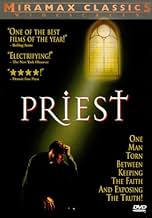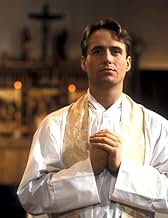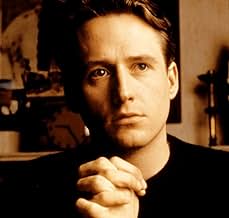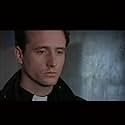A homosexual Catholic priest finds out during confessional that a young girl is being sexually abused by her father, and has to decide how to deal with both that secret and his own.A homosexual Catholic priest finds out during confessional that a young girl is being sexually abused by her father, and has to decide how to deal with both that secret and his own.A homosexual Catholic priest finds out during confessional that a young girl is being sexually abused by her father, and has to decide how to deal with both that secret and his own.
- Nominated for 1 BAFTA Award
- 5 wins & 3 nominations total
- Director
- Writer
- All cast & crew
- Production, box office & more at IMDbPro
Featured reviews
Insightful movie. Makes you reflect a lot on the reality of those who embrace celibacy as priests. There are issues in today's world that affect priests and their commitment as ministers in the Church that this movie brings out very well. It might have been considered a very provocative movie when it came out, but it honestly reflects Church reality in some countries. It makes you realize the humanness of priests and the emotional, moral and spiritual problems they grapple with. I liked the ending the best - the only one in the Church capable of forgiving and accepting the gay priest, was the young girl who had been abused by her father and who had confided in the priest. Very touching and realistic.
From the symbolic introductory scene of "Priest" wherein an old, weary-looking priest yanks a huge crucifix from the church altar, proceeds to carry it through the streets of his impoverished town as if he were Jesus himself, and proceed to bash through the door of his presbytery, you know you're in for something different - stimulating, controversial, thought-provoking. "Priest" is VERY MUCH that movie.
The old priest's clerical replacement comes in the form of Father Greg (Linus Roache, in a star-making role), a young, fair-haired, boyishly handsome visionary who, with typically youthful verve, strives to bring the Catholic Church directly to the people (well, to the Catholics, anyway), and receives his actions with decidedly mixed feelings. The older priest still in residence, Father Matthew (the excellent Tom Wilkinson), who has long settled into amiable apathy, inclines toward drink while maintaining a relatively clandestine relationship with his black, attractively careworn housekeeper (the underused Cathy Tyson). There is initial friction as the Old and New Worlds collide. Father Matthew dismisses Father Greg's modernistic sermons, while Father Greg frowns upon Father Matthew's casual stance on papal celibacy. Eventually, we learn Father Greg has his own difficulty with celibacy...but with other men.
As the story proceeds, we are drawn into the emotional and moral struggles of Father Greg as he wrestles not only with his own social and spiritual ethics, but those of his parish. In one particularly chilling confessional scene, a male member of the parish practically flaunts his sexual desires while "justifying" his incestuous advances toward his teenage daughter.
"Priest" is an important, ambitious project and yields emotional power in its depiction of moral adversity. But it's a mixed blessing. Some of the scenes come off overbaked and melodramatic, while the resolution of the piece should be more powerful and less compromising; instead it comes off manufactured and unrealistic, hurting its overall impact.
In fairness, "Priest" does bring out the hypocrisy in both priests, as well as the parish. Nobody comes off saintly here, just flawed and human. An interesting bi-note is that there have been no comments in the fact that the elder priest is having a sexual relationship with a BLACK housekeeper. Forty years ago, according to religious purists, the Bible interpreted ethnically mixed relationships and marriages as abominations as well. At least some headway HAS been made.
Is "Priest" anti-Catholic in its message? To an extent, yes. The Catholic's Church's unyielding, unprogressive, medieval doctrines are brought to task here, never more pointedly than in the scene where Father Greg, agonizing over whether to prevent the continued sexual abuse of the young girl and report the father to authorities, or respect the confidentiality of the confessional and remain silent, reluctantly chooses the latter.
While I deem this movie to be a stronger platform for social tolerance, `Priest' still drums home beautifully the message that organized religion is still used as a tool to govern instead of instill moral standards, particularly in other countries, and as a persecutive weapon against certain sectors of society that do not conform to those rigid standards. As a consequence, the Church has provided a comforting harbor and hazardous safety zone for certain "acceptable" bigotries.
We need more brave, topical films like "Priest" to confront such important social issues and display them front-and-center.
The old priest's clerical replacement comes in the form of Father Greg (Linus Roache, in a star-making role), a young, fair-haired, boyishly handsome visionary who, with typically youthful verve, strives to bring the Catholic Church directly to the people (well, to the Catholics, anyway), and receives his actions with decidedly mixed feelings. The older priest still in residence, Father Matthew (the excellent Tom Wilkinson), who has long settled into amiable apathy, inclines toward drink while maintaining a relatively clandestine relationship with his black, attractively careworn housekeeper (the underused Cathy Tyson). There is initial friction as the Old and New Worlds collide. Father Matthew dismisses Father Greg's modernistic sermons, while Father Greg frowns upon Father Matthew's casual stance on papal celibacy. Eventually, we learn Father Greg has his own difficulty with celibacy...but with other men.
As the story proceeds, we are drawn into the emotional and moral struggles of Father Greg as he wrestles not only with his own social and spiritual ethics, but those of his parish. In one particularly chilling confessional scene, a male member of the parish practically flaunts his sexual desires while "justifying" his incestuous advances toward his teenage daughter.
"Priest" is an important, ambitious project and yields emotional power in its depiction of moral adversity. But it's a mixed blessing. Some of the scenes come off overbaked and melodramatic, while the resolution of the piece should be more powerful and less compromising; instead it comes off manufactured and unrealistic, hurting its overall impact.
In fairness, "Priest" does bring out the hypocrisy in both priests, as well as the parish. Nobody comes off saintly here, just flawed and human. An interesting bi-note is that there have been no comments in the fact that the elder priest is having a sexual relationship with a BLACK housekeeper. Forty years ago, according to religious purists, the Bible interpreted ethnically mixed relationships and marriages as abominations as well. At least some headway HAS been made.
Is "Priest" anti-Catholic in its message? To an extent, yes. The Catholic's Church's unyielding, unprogressive, medieval doctrines are brought to task here, never more pointedly than in the scene where Father Greg, agonizing over whether to prevent the continued sexual abuse of the young girl and report the father to authorities, or respect the confidentiality of the confessional and remain silent, reluctantly chooses the latter.
While I deem this movie to be a stronger platform for social tolerance, `Priest' still drums home beautifully the message that organized religion is still used as a tool to govern instead of instill moral standards, particularly in other countries, and as a persecutive weapon against certain sectors of society that do not conform to those rigid standards. As a consequence, the Church has provided a comforting harbor and hazardous safety zone for certain "acceptable" bigotries.
We need more brave, topical films like "Priest" to confront such important social issues and display them front-and-center.
Father Greg Pilkinton (Linus Roache) is a young, dedicated, idealistic and yet conservative (comparing to his colleague, Father Matthew Thomas, played by Tom Wilkinson) priest who has recently arrived in his new parish. He works hard with total faith and devotion. Soon after moving in to Father Matthew's house, he discovers that Father Matthew has been having a relationship with his maid. Later on, a school girl, Lisa (Christine Tremarco) confesses to him that her father has been sexually abusing her, Father Greg faces his inner struggle on whether to reveal the truth to the authority, or remain silent in order not to break his vow.
Confused and frustrated, Father Greg goes to a pub and meets Graham (Robert Carlyle) and later they have sex. They are to stay in an on-and-off relationship. Now Father Greg must confront his human desire and his sexuality. Eventually, he also has to deal with his being arrested while making love in a parked car and the devastating consequences.
This film challenges the entire system. Must a priest (or a nun) remain celibate? Should we leave out non-heterosexuals for being Catholics or whatever? Must a priest remain silent when hearing a serious problem or even an about-to-be-committed crime (which happens all the time in Northern Ireland) and do nothing? Can all priests honestly give themselves away completely to God and refrain from letting their human emotion, human desire flow? Don't some priests become child molesters because they've been trying to repress their human desire for too long (this seems outside the subject. On the other hand, not all priests commit such a crime)? Should we refuse to show compassion towards certain people simply because they are different from us and that their life styles are 'not accepted' by society or the usual moral standard? Still, who is the hypocrite here? Father Matthew's relationship with his housekeeper has never been revealed. If otherwise, he would be rejected, too. He leads a double life. Being a 'liberal' priest and breaking his vow of celibacy at the same time. But WHO are the hypocrites? Aren't we all?
'Priest' is not about a story of one priest. It's about any one priest. And the movie is compelling and well-made. One thing for sure, the Roman Catholic Church would not be pleased with this film.
Confused and frustrated, Father Greg goes to a pub and meets Graham (Robert Carlyle) and later they have sex. They are to stay in an on-and-off relationship. Now Father Greg must confront his human desire and his sexuality. Eventually, he also has to deal with his being arrested while making love in a parked car and the devastating consequences.
This film challenges the entire system. Must a priest (or a nun) remain celibate? Should we leave out non-heterosexuals for being Catholics or whatever? Must a priest remain silent when hearing a serious problem or even an about-to-be-committed crime (which happens all the time in Northern Ireland) and do nothing? Can all priests honestly give themselves away completely to God and refrain from letting their human emotion, human desire flow? Don't some priests become child molesters because they've been trying to repress their human desire for too long (this seems outside the subject. On the other hand, not all priests commit such a crime)? Should we refuse to show compassion towards certain people simply because they are different from us and that their life styles are 'not accepted' by society or the usual moral standard? Still, who is the hypocrite here? Father Matthew's relationship with his housekeeper has never been revealed. If otherwise, he would be rejected, too. He leads a double life. Being a 'liberal' priest and breaking his vow of celibacy at the same time. But WHO are the hypocrites? Aren't we all?
'Priest' is not about a story of one priest. It's about any one priest. And the movie is compelling and well-made. One thing for sure, the Roman Catholic Church would not be pleased with this film.
Priest is a powerful and well-acted film. It exposes the hypocrisy of the Catholic Church (not hard to do) but it is also about the larger issues of faith, compassion and forgiveness. The film is NOT ABOUT being a gay priest.
It speaks to any thinking person who has ever questioned their faith only to find that there are no answers and that faith is all there is.
Father Greg (Linus Roche) is gay and conflicted. On one hand he is certain that God wants him to be a priest. On the other hand, he is not certain that God exists. All he has is faith and faith abandons him in the face of evil.
The conversations between Father Greg and Father Matthew (Tom Wilkinson) are compelling. Did Jesus have it easier than everyone else because he knew what his purpose was? Do men's laws need to be followed as strictly as God's laws? Can the rules be changed just because they don't suit us?
The only wrong note struck in the film is when Father Greg removes his collar, gets on his bike and heads to a gay bar. With quick ease he catches the eye of a stranger and they are soon in bed without so much as a hello. A little too Brian- from- Queer- as- Folk if you ask me but, whatever.
You've got to grin at the sacrilegious irony of a disgruntled priest removing a large crucifix from a church, walking through the streets with it over his shoulder and smashing it into the rectory.
The battle of bible quotes between Father Greg and a devout parishioner perfectly illustrates the futility of proving your point through bible verse.
The ending is powerful and perfect. Get your tissue box out because if you don't bawl like a baby there is a black hole where your heart should be.
.
It speaks to any thinking person who has ever questioned their faith only to find that there are no answers and that faith is all there is.
Father Greg (Linus Roche) is gay and conflicted. On one hand he is certain that God wants him to be a priest. On the other hand, he is not certain that God exists. All he has is faith and faith abandons him in the face of evil.
The conversations between Father Greg and Father Matthew (Tom Wilkinson) are compelling. Did Jesus have it easier than everyone else because he knew what his purpose was? Do men's laws need to be followed as strictly as God's laws? Can the rules be changed just because they don't suit us?
The only wrong note struck in the film is when Father Greg removes his collar, gets on his bike and heads to a gay bar. With quick ease he catches the eye of a stranger and they are soon in bed without so much as a hello. A little too Brian- from- Queer- as- Folk if you ask me but, whatever.
You've got to grin at the sacrilegious irony of a disgruntled priest removing a large crucifix from a church, walking through the streets with it over his shoulder and smashing it into the rectory.
The battle of bible quotes between Father Greg and a devout parishioner perfectly illustrates the futility of proving your point through bible verse.
The ending is powerful and perfect. Get your tissue box out because if you don't bawl like a baby there is a black hole where your heart should be.
.
Priests are not often the heroes of movies:some famous predecessors were Robert Bresson's "journal d'un curé de campagne" (1945),Luis Bunuel's "Nazarin" (1958) and Jean-Pierre Melville 's "Leon Morin prêtre" (1961).But none of these directors went as far as Antonia Bird .Their movies were perhaps esthetically better,but nothing shocking for people who were brought up religiously ,nothing like the pictures of this priest lying on a bed with his lover.One will add that Bunuel's movie was looked upon as "very Christian" by the Spanish censorship when it was exactly the contrary.But it's difficult to consider Bird's work a fable:it's a realistic story,where sex occupies the center of the plot:sex between the other priest and the housekeeper,sex between the father and his daughter,sex between Rochman and Carlyle .Bird's style,though depicting the poor sides of Liverpool is very different from Kenneth Loach's .Her pictures are polished up ,like the one in confessional where the incest father is speaking through the grille ,or the two lovers on the beach.
Bird's movie is very interesting because it broaches the problem of celibacy in the catholic religion (protestant priests are allowed to marry aren't they),and,as the hero remarks "Jesus did not ask for chastity did he?"A hero who is not always very smart:"be discreet" he tells to his colleague who sleeps with the housekeeper,but he kisses his lover in a car in broad daylight.
The final battle in the church is particularly interesting,because it's a battle of words,repeating quotations from the Bible,and there are so many ways of interpreting its meanings .It seems that the priest uses the New testament ( judge not lest...,Mary Magdelene, forgive not seven times but seventy)whereas his enemy draws from the old one (a man sleeping with a man is an abomination).
The seal of the confessional subject is not that much new however:even in 1953,Hitchcock made "I confess" in which Montgomery Clift was confronted to the same problem.
Best line;the older priest ,telling a shocked congregation that God is probably too busy to care about what men do with their d.....
Bird's movie is very interesting because it broaches the problem of celibacy in the catholic religion (protestant priests are allowed to marry aren't they),and,as the hero remarks "Jesus did not ask for chastity did he?"A hero who is not always very smart:"be discreet" he tells to his colleague who sleeps with the housekeeper,but he kisses his lover in a car in broad daylight.
The final battle in the church is particularly interesting,because it's a battle of words,repeating quotations from the Bible,and there are so many ways of interpreting its meanings .It seems that the priest uses the New testament ( judge not lest...,Mary Magdelene, forgive not seven times but seventy)whereas his enemy draws from the old one (a man sleeping with a man is an abomination).
The seal of the confessional subject is not that much new however:even in 1953,Hitchcock made "I confess" in which Montgomery Clift was confronted to the same problem.
Best line;the older priest ,telling a shocked congregation that God is probably too busy to care about what men do with their d.....
Did you know
- TriviaThe Catholic Church in Ireland were very vocal about their views in having the film banned from theatrical distribution. The film censor disagreed and the film was released with an 18 certificate. This marked a major turning point in the relationship between the church and the Irish Film Censor board.
- GoofsFather Greg holds up a communion wafer which is smooth. The scene cuts to Graham and then back to Father Greg, and the wafer has a diagonal line across it.
- Quotes
Father Greg Pilkington: [addressing Father Redstone in Latin] Abi et futue te ipsum, sordide senex.
[Translation: Go fuck yourself, you dirty old man]
- Alternate versionsThe US version has been cut by seven minutes.
- SoundtracksGreen Green Grass of Home
Composed by Curly Putman
Performed by Tom Wilkinson
Copyright Tree International
by kind permission of Burlington Music Co. Ltd./Warner Chappell Music Ltd.
- How long is Priest?Powered by Alexa
Details
- Release date
- Country of origin
- Official site
- Languages
- Also known as
- Actos privados
- Filming locations
- Blundellsands, Merseyside, England, UK(beach scene with boy and coffee)
- Production companies
- See more company credits at IMDbPro
Box office
- Gross US & Canada
- $4,165,845
- Opening weekend US & Canada
- $113,430
- Mar 26, 1995
- Gross worldwide
- $4,165,845
- Runtime
- 1h 45m(105 min)
- Color
- Sound mix
- Aspect ratio
- 1.66 : 1
Contribute to this page
Suggest an edit or add missing content


